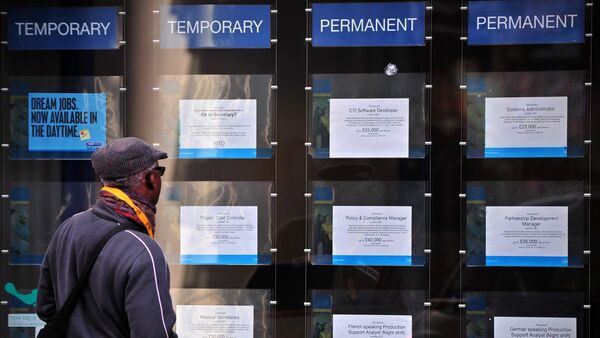Kristian Rouz – Britain’s labour market improved significantly, with joblessness slumping to its seven-year lowest in the third quarter, suggesting the Bank of England (BoE) has a reason enough to lift its base interest rate, following a similar move by the US Federal Reserve within a matter of a few months.
While it is yet unknown whether the gains in disposable incomes will spur consumer spending, the monetary authorities of Great Britain are poised to put any action on hold, watching macro indicators for another quarter or two.
Britain’s joblessness rate dropped to 5.3% in Q3, down from 5.6% in the second quarter, to its lowest since spring 2008, according to data by Office for National Statistics (ONS). During the third quarter, the UK added 177,000 new jobs, extending the nation’s active workforce to 31.2 mln people. A separate indicator, the UK working age employment rate, rose to 73.7%, its highest on the record since 1971.
Even though economic acceleration and labour market gains have been indeed an indication the British economy is recovering, suggesting a raise in borrowing costs by the BoE should follow soon, the data also suggest some economic anxiety. The salaries growth has slowed: earnings without bonuses added 2.5% year-on-year in Q3, down from 2.8% in the second quarter. Still, as bonuses jumped 15%, waged added an annualized 3%.
The wage growth controversy suggests the BoE will postpone tightening their policies, including a liftoff in base interest, until two or three quarters later.
A stagnant inflation is also somewhat of a concern. While hindering the overall economic growth, the weak core prices index helped propel household’s disposable incomes 2.3% higher this year, paradoxically helping economic expansion. It is yet unclear whether the British consumers would increase spending toward the end of the year, and if they do, gains in economic growth might turn out significant enough to help the BoE make their decision on monetary tightening.
Meanwhile, UK labour productivity is increasing, while the workforce is becoming somewhat limited in numbers. Salaries are thus bound to increase in the short-term, but inflation might suffer further as supply-side of the British economy is nearing full capacity. Immigration would hardly help: the ONS reported the amount of EU national working in the UK increased by only 324,000 in the past twelve months.
That said, the upbeat employment data may turn out to be a negative sign for the Great Britain’s monetary authorities, as the nearing full employment hardly supports the broader economic expansion.






